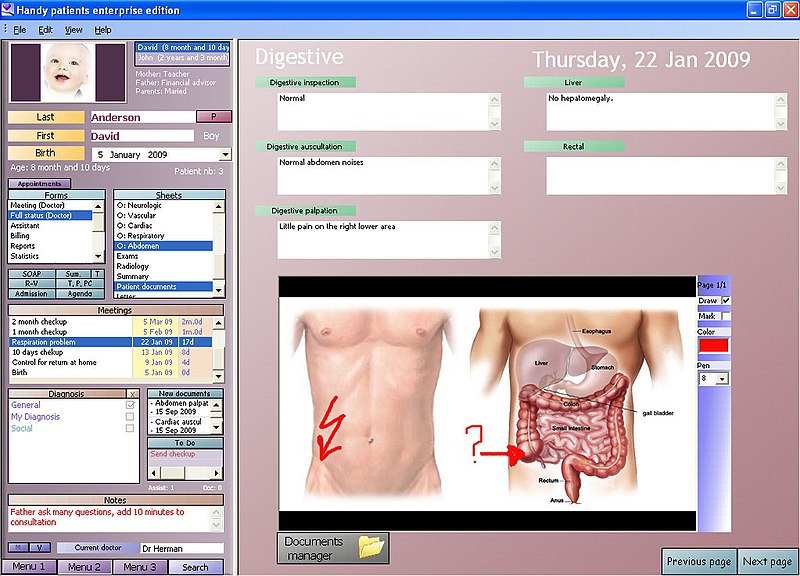Last Update: 01/25/16
Medication errors and drug dosage mistakes occur for many reasons, including bad handwriting by doctors in the instructions and directions they leave in patient files and medical records. To reduce medication errors and medical mistakes, technology has been developed to put patient records and medical files into a computerized or digital format. Typed information is argued to be easier to read than handwriting – having everything on a computer screen should allow for easy double-checking of questionable entries – so technology was designed to help reduce medication errors that can seriously harm or even kill someone.
What is an Electronic Health Record?
An electronic health record (”EHR”) is a computer file that collects and organizes the health background and personal information of a patient from a wide variety of sources, such as:
- Progress notes
- Past medical history
- Current health problems and diagnoses
- Drugs and Medications
- Record of vital signs
- Allergies
- Immunizations
- laboratory reports (blood word, radiology, etc.).
These EHRs are intended to build a complete picture of the patient’s health over time, as various providers contribute information to the patient’s EHR. It is thought that sharing of information between health care providers in this manner will not only assist in providing better care to the patient, but it will work to prevent medical mistakes and medication errors.
EHRs Filled With Doctors’ Copy and Paste Information Creating Big Problems
The American Health Information Management Association is warning that a big problem has already arisen in the use of EHRs: medication errors and other medical mistakes are resulting from EHRs because doctors are using “copy and paste” functions to fill out these EHRs.
According to the AHIMA study, 74-90% of American physicians save time by simply copying and pasting blocks of text in one EHR after another, and right now as much as 78% of EHR physician notes are copied text.
U.S. Department of Health and Human Services Secretary Kathleen Sebelius and Attorney General Eric Holder have warned that “[a] patient’s care information must be verified individually to ensure accuracy: It cannot be cut and pasted from a different record of the patient, which risks medical errors as well as overpayments.” Read the Sebelius and Holder letter to the major medical associations/groups here.
New Pennsylvania Study on Medication Errors Caused by Using EHRs
This month, a new study was released from research compiled from the State of Pennsylvania’s state-wide EHR system, Pennsylvania Patient Safety Reporting System (PA-PSRS) database, where thousands of medication errors were found to have been caused by using EHRs to record patient information.
These included harm caused by:
- entering wrong medication data
- administering the wrong medication
- ignoring a documented allergy
- failing to enter lab tests
- failing to document an allergy to penicillin.
Medication errors were involved in 81% of the Pennsylvania;s documented EHR safety events. These included:
- wrong Drug
- wrong Dose
- wrong Time
- wrong Patient
- wrong Route.
Lots of simple mistakes were found in the Pennsylvania EHRs, too, things that might cause serious or fatal problems down the road, including:
- transposition mistakes
- transcription errors
- incorrect patient information (age, weight, etc.)
- wrong physician name.
What Should You Do Now?
A good piece of advice if you have been harmed by a medication error, is to at least speak with an experienced personal injury lawyer before you file a claim to learn about some of the issues that can arise with these claims, including the type of evidence needed to prove a claim and the type and amount of damages you can recover. Most personal injury lawyers, like Alan Sackrin, will offer a free initial consultation (over the phone or in person) to answer your questions.
Related:
- Medication Errors: Medicine Mistakes and Drug Errors Kill and Seriously Hurt Patients – A Shocking Secret Revealed
- Medication Errors and Drug Mistakes: Does Bad Communication Between Medical Professionals Hinder Patient Safety From Medication Errors and Drug Mistakes?
__________________
 Do you have questions or comments? Then please feel free to send Alan an email or call him now at (954) 458-8655.
Do you have questions or comments? Then please feel free to send Alan an email or call him now at (954) 458-8655.

